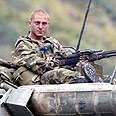
The US ambassador to Moscow, in a rare US comment endorsing Russia's initial moves in Georgia, described the Kremlin's first military response as legitimate after Russian troops came under attack.
US officials, including President George W. Bush, have strongly criticized Moscow's subsequent action but have not focused on the initial chain of events that triggered the conflict between Russian and US-ally Georgia.
The war broke out after Georgia tried to retake its Moscow-backed breakaway region of South Ossetia, prompting a counter-attack by Russian forces.
In his first major interview since his arrival as Ambassador last month, John Beyrle gave the Russian daily Kommersant his views on the conflict and warned about its impact on US investor confidence in Russia.
"Now we see Russian forces, which responded to attacks on Russian peacekeepers in South Ossetia, legitimately, we see those forces now having advanced on to the soil of Georgia; Georgian territorial integrity is in question here," Beyrle told the newspaper.
He said Washington had not sanctioned Georgia's initial actions when on August 8, after a succession of tense skirmishes, Georgian forces attacked South Ossetia, triggering a massive Russian reaction when its peacekeepers there came under fire.
"We did not want to see a recourse to violence and force and we made that very, very clear," Beyrle was cited as saying in quotes the US embassy confirmed as accurate.
"The fact that we were trying to convince the Georgian side not to take this step is clear evidence that we did not want all this to happen," Beyrle said in the interview, which was published on Friday.
"We have seen the destruction of civilian infrastructure, as well as calls by some Russian politicians to change the democratically-elected government of Georgia. Some question the territorial integrity of Georgia. That is why we believe that Russia has gone too far," the envoy said.
Beyrle said Washington still supports Russia's bid to join the World Trade Organization, which has still not been finalised after more than a decade of talks.
"But American investors are now looking at the situation around Russia with concern and asking questions," he said.
Report: Troops begin withdrawing from Gori
A senior Georgian official told AFP on Friday that Russian forces have begun withdrawing from the flashpoint Georgian city of Gori and have promised to leave there by 5 pm (1300 GMT).
"Russian General (Vyacheslav) Borisov told me that the Russians will leave Gori today by 1700 and that by 2000 they will be in Java (in South Ossetia)," Georgian National Security Council Secretary Alexander Lomaia said by telephone from Gori.
"I can confirm that the Russians have already abolished two checkpoints in Gori and that 13 Russian armored vehicles have left the city," he said.
Earlier, a German government spokesman said his country expects a full withdrawal of Russian troops from the heart of Georgia but has not seen clear signs yet of a substantial pullback, a government spokesman said.
"We are assuming and have a clear expectation that we will see a full withdrawal of Russian troops from Georgia, from the core areas of Georgia, in the course of the day," government spokesman Thomas Steg told a news conference. "This morning it was not clear that one could say with any certainty that a substantial withdrawal was taking place."
A top US general said Friday that Russia's pullout of troops from Georgia is "far too little, far too slow."
"The information I have is that if they are moving, it's at a snail's pace - far too little, far too slow," General John Craddock, the head of the US European Command, told reporters in the Georgian capital, Tbilisi. "It needs to increase," he said.
The first Russian navy ship returned to base in the Black Sea on Friday from operations against Georgia.
A Reuters correspondent said about 100 Ukrainian protesters, brought by bus by a local party from a nearby town, marched through the Crimean port of Sevastopol as the Mirage, a small missile ship, returned.
AFP contributed to this report















